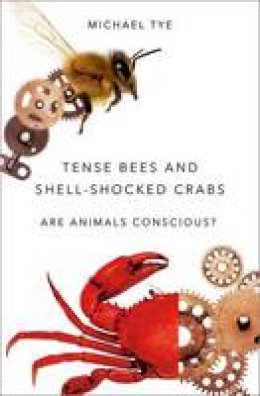3%OFF

Stock image for illustration purposes only - book cover, edition or condition may vary.
Tense Bees and Shell-Shocked Crabs: Are Animals Conscious?
Michael Tye
€ 41.99
€ 40.65
FREE Delivery in Ireland
Description for Tense Bees and Shell-Shocked Crabs: Are Animals Conscious?
Hardback. What is it like 'on the inside' for nonhuman animals? Do they feel anything? Most people happily accept that dogs, for example, share many experiences and feelings with us. But what about simpler creatures? Fish? Honeybees? Crabs? Turning to the artificial realm, what about robots? This book presents answers to these questions. Num Pages: 256 pages. BIC Classification: HPQ; JM; PSAN. Category: (G) General (US: Trade). Dimension: 151 x 218 x 24. Weight in Grams: 400.
In the seventeenth century, the famous French philosopher, Rene Descartes, held that nonhuman animals, lacking souls, are organic automata without any consciousness. This led him to participate in vivisections on dogs, dismissing their howls as mere noises. Voltaire later ridiculed Descartes' view; and it is certainly a position to which hardly anyone would subscribe today. But just which animals are conscious? Most people would admit mammals generally; but what about fish? Honeybees? Crabs? Turning to the artificial realm, what about suitably complex robots? These questions are hard to answer in part because feelings and experiences are subjective things, and we have no direct access to the feelings and experiences of others. Exacerbating the issue is the fact that there are differences between human brains and the brains of nonhuman creatures. With the differences in neurophysiology, perhaps the crucial feature underwriting any spark of consciousness is missing with the result that the animals simply function in ways that are similar to us along various dimensions without feeling as we do on the inside or feeling anything at all for that matter. In some cases, the differences in neurophysiology seem acute. Take fish, for example, or insects. Fish lack a neocortex, as do insects, and, in humans, consciousness is often held to require cortical activity. The present book suggests a methodology for dealing with these questions, without endorsing any specific theory of the nature of consciousness (about which there is little agreement anyway), and offers concrete answers. In the final chapter, there is a discussion of the ethical treatment of animals and related issues, including whether we should be vegetarians.
Product Details
Publisher
Oxford University Press Inc
Format
Hardback
Publication date
2017
Condition
New
Weight
400g
Number of Pages
256
Place of Publication
New York, United States
ISBN
9780190278014
SKU
V9780190278014
Shipping Time
Usually ships in 15 to 20 working days
Ref
99-12
About Michael Tye
Michael Tye encountered philosophy at Oxford and taught at Temple University, St. Andrews, and the University of London before coming to the University of Texas at Austin in 2003, where he is the Dallas TACA Centennial Professor in Liberal Arts.
Reviews for Tense Bees and Shell-Shocked Crabs: Are Animals Conscious?
Arguing from straightforward principles, he comes to the conclusion that consciousness is widespread. Along the way, he marshals an impressive array of empirical evidence, focusing on the traditionally overlooked corners of the animal world...a book devoted to the complexity and wonder of sections of the animal kingdom mostly overlooked in ordinary ethical discussions. This is a book rich in empirical examples, which is sure to generate discussion and controversy on a timely topic.
Colin Klein, Notre Dame Philosophical Reviews
Colin Klein, Notre Dame Philosophical Reviews
